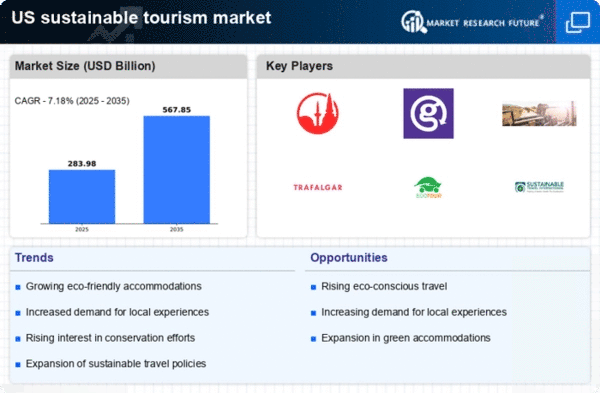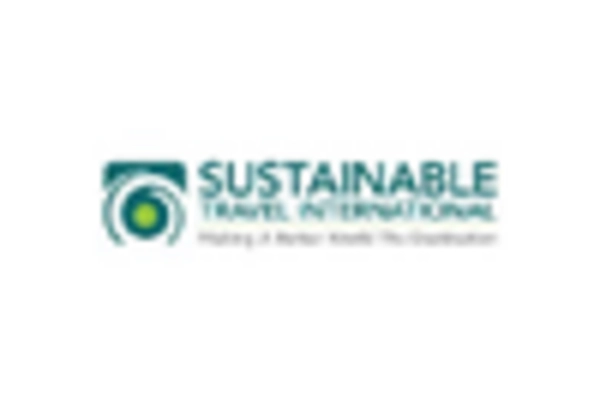Rise of Local Experiences
The sustainable tourism market is witnessing a surge in demand for local experiences that foster cultural immersion and community engagement. Travelers are increasingly interested in authentic experiences that allow them to connect with local cultures and support local economies. This trend is reflected in the growing popularity of community-based tourism initiatives, which often emphasize sustainability and responsible travel practices. Reports indicate that nearly 60% of US travelers are willing to pay a premium for experiences that benefit local communities. This shift not only enhances the travel experience but also contributes to the economic viability of local populations. Consequently, businesses that focus on providing local experiences are likely to thrive within the sustainable tourism market, as they align with the values of modern travelers.
Increased Focus on Climate Change
The sustainable tourism market is shaped by the global focus on climate change and its implications for travel. As awareness of climate-related issues grows, travelers are becoming more discerning about their travel choices. A significant portion of the US population, approximately 65%, now considers the environmental impact of their travel decisions. This heightened awareness is prompting businesses within the sustainable tourism market to adopt more sustainable practices, such as carbon offset programs and eco-friendly transportation options. The emphasis on climate change not only influences consumer behavior but also drives innovation within the industry. Companies that proactively address climate concerns are likely to enhance their brand reputation and attract a loyal customer base, thereby contributing to the overall growth of the sustainable tourism market.
Consumer Demand for Ethical Travel
The sustainable tourism market is experiencing a notable shift in consumer preferences, with travelers increasingly seeking ethical travel options. This demand is driven by a growing awareness of environmental issues and a desire to minimize their carbon footprint. According to recent surveys, approximately 70% of travelers in the US express a preference for eco-friendly accommodations and activities. This trend indicates that businesses within the sustainable tourism market must adapt to meet these evolving consumer expectations. As a result, companies that prioritize sustainability in their offerings are likely to gain a competitive edge, potentially leading to increased market share and profitability. Furthermore, the emphasis on ethical travel is not just a passing trend; it appears to be a fundamental change in consumer behavior that could shape the future of the sustainable tourism market.
Government Regulations and Incentives
The sustainable tourism market is significantly influenced by government regulations and incentives aimed at promoting environmentally responsible practices. Various federal and state initiatives encourage businesses to adopt sustainable practices through tax breaks, grants, and other financial incentives. For instance, the US government has allocated over $1 billion in funding for projects that enhance sustainability in tourism. These regulations not only foster a more sustainable tourism market but also create a level playing field for businesses that prioritize eco-friendly practices. Compliance with these regulations can enhance a company's reputation and attract a growing segment of environmentally conscious consumers. As such, the interplay between government policy and the sustainable tourism market is likely to shape industry dynamics in the coming years.
Technological Innovations in Sustainability
The sustainable tourism market is being transformed by technological innovations that enhance sustainability practices. Advancements in technology, such as renewable energy solutions, smart waste management systems, and eco-friendly transportation options, are becoming increasingly prevalent. For instance, the integration of solar energy in hotels and resorts has shown to reduce energy costs by up to 30%. Additionally, mobile applications that promote sustainable travel choices are gaining traction among consumers. These technologies not only improve operational efficiency but also appeal to environmentally conscious travelers. As the sustainable tourism market continues to evolve, the adoption of innovative technologies is likely to play a crucial role in shaping the future landscape of the industry.
















